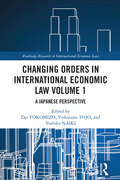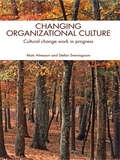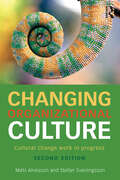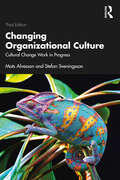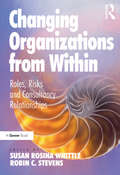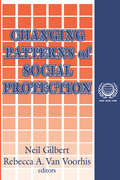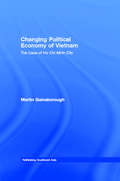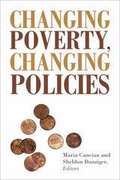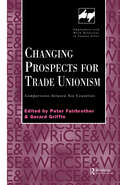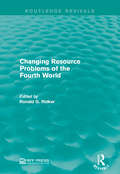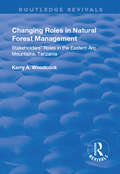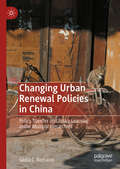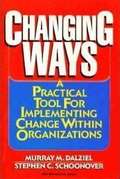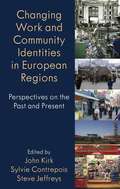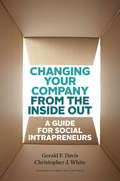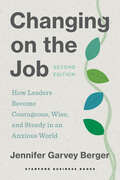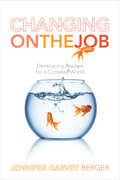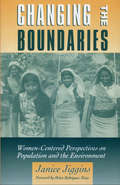- Table View
- List View
Changing Orders in International Economic Law Volume 1: A Japanese Perspective (Routledge Research in International Economic Law)
by Dai Yokomizo Yoshizumi Tojo Yoshiko NaikiThese two groundbreaking volumes look at complex legal issues in the changing global economy from the perspective of Asia and/or Japan. Contributors scrutinize the past, present, and future and discuss what the global legal order in economic fields could be like by navigating uncertain and turbulent times. The books address six main themes: (1) Polarization and diversification of values, progress of regionalism and restructuring of multilateral rules, (2) Full-scale arrival of the digital economy and its impact, (3) Empowerment of private persons/entities, (4) Reconsideration of the concept of “territorial jurisdiction”, (5) Law of national security and rule in emergency situations, and (6) Values of Sustainable Development Goals (SDGs) in trade and investment liberalization rules. The book also examines various legal problems under the COVID-19 crisis and suggests how the post COVID-19 global economic order will be from the perspective of Asia and/or Japan. This comprehensive insight will shed light on the intertwined and complex phenomena of the world economy and allow readers of business law and international law to have a better understanding of this volatile era.
Changing Orders in International Economic Law Volume 2: A Japanese Perspective (Routledge Research in International Economic Law)
by Dai Yokomizo Yoshizumi Tojo Yoshiko NaikiThese two groundbreaking volumes look at complex legal issues in the changing global economy from the perspective of Asia and/or Japan. Contributors scrutinize the past, present, and future and discuss what the global legal order in economic fields could be like by navigating uncertain and turbulent times. The books address six main themes: (1) Polarization and diversification of values, progress of regionalism and restructuring of multilateral rules, (2) Full-scale arrival of the digital economy and its impact, (3) Empowerment of private persons/entities, (4) Reconsideration of the concept of “territorial jurisdiction”, (5) Law of national security and rule in emergency situations, and (6) Values of Sustainable Development Goals (SDGs) in trade and investment liberalization rules. The books also examine various legal problems under the COVID-19 crisis and suggest how the post-COVID-19 global economic order will be from the perspective of Asia and/or Japan. This comprehensive insight will shed light on the intertwined and complex phenomena of world economy and allow readers of business law and international law to have a better understanding of this volatile era.
Changing Organizational Culture: Cultural Change Work in Progress
by Mats Alvesson Stefan SveningssonHow do people react to significant organizational change? Do we see ourselves as helping change to come about, or allowing change to happen around us? How can we adapt more easily to change? Based around an illuminating extended case-study, this important text uncovers the reality of organizational change. From planning and inception to project management and engagement, this book explores the views and reactions of various stakeholders undergoing real-life change processes. Drawing on theories of organizational culture, it helps us to understand how organizations can promote change without alienating the people needed to implement it. Changing Organizational Culture represents an original and timely addition to the literature on organizational change. It is vital reading for all students, researchers and practitioners working in organizational theory and behaviour, change management and HRM.
Changing Organizational Culture: Cultural Change Work in Progress
by Mats Alvesson Stefan SveningssonHow is practical change work carried out in modern organizations? And what kind of challenges, tasks and other difficulties are normally encountered as a part of it? In a turbulent and changing world, organizational culture is often seen as central for sustained competitiveness. Organizations are faced with increased demands for change but these are often so challenging that they meet heavy resistance and fizzle out. Changing Organizational Culture encourages the development of a reflexive approach to organizational change, providing insights as to why it may be difficult to maintain momentum in change processes. Based around an illuminating case study of a cultural change programme, the book provides 15 lessons on the entire change journey; from analysis and design, to implementation and how organizational members should approach change projects. This enhanced edition considers the most recent studies on organizational change practice, with new examples from businesses and the public sector, and includes one empirical study which uses the authors’ own framework, enriching their practical recommendations. It also draws on the latest theoretical developments, including ideas of power and storytelling. Accompanying the text is an online pedagogic and research ideas guide available for course instructors and lecturers at Routledge.com. Changing Organizational Culture will be vital reading for students, researchers and practitioners working in organizational studies, change management and HRM.
Changing Organizational Culture: Cultural Change Work in Progress
by Mats Alvesson Stefan SveningssonHow is practical change work carried out in modern organizations? And what kind of challenges, tasks and other difficulties are normally encountered? In a turbulent and changing world, organizational culture is often seen as central for sustained competitiveness. Organizations are faced with increased demands for change but these are often so challenging that they meet heavy resistance and fizzle out. Changing Organizational Culture encourages the development of a reflexive approach to organizational change, providing insights as to why it may be difficult to maintain momentum in change processes. Based around an illuminating case study of a cultural change programme, the book provides 15 lessons on the entire change journey; from analysis and design to implementation and how organizational members should approach change projects. This updated and enhanced third edition considers the most recent studies on organizational change practice, with new examples from businesses and the public sector, and it includes one empirical study which uses the authors’ own framework, enriching their practical recommendations. It also draws on the latest theoretical developments, including ideas of power, identity and storytelling. Changing Organizational Culture is vital reading for students, researchers and practitioners working in organizational studies, change management and HRM.
Changing Organizations from Within: Roles, Risks and Consultancy Relationships
by Robin C. StevensOrganizational change is often insider-led and supported by internal consultants and change agents. Most of what is written about change comes from the perspective of external consultants or from academics researching the activities of those with insider change roles. Changing Organizations from Within is unusual in providing a range of authentic insider accounts. The editors define 'insiders' as employees who lead and support change efforts within their own organizations, and those psychoanalytically aware external consultants - external 'insiders' - who work closely with organizations and use the dynamics of transference and projection in their relationships with clients to illuminate organizational issues. Each chapter is written by an author with experience of different kinds of insider relationships with their client organizations. Some work 'inside' as employees. Some are external consultants whose work involves developing insightful insider perspectives. The book’s editors and several of the authors are graduates, or have been faculty members, of London's Tavistock Institute Advanced Organizational Consultation programme, with experience of running development programmes for consultants and of coaching insiders. Changing Organizations from Within examines the pulls on role and identity that can easily undermine competence and practice. Understanding the system psycho-dynamics present in organizations helps consultants and change agents to make use of an insider perspective without becoming enmeshed in the client organization's regressive and inertial dynamics. The authors provide practical advice to help insiders navigate organizational space, make sense of tricky situations, and work more mindfully to help organizations change.
Changing Patterns of Social Protection
by Gaurav Sharma""A thoughtful assessment of socioeconomic needs and influences, observing the necessity for benefits as well as the lessons of experience offered by various nations""--Library Bookwatch Over the last two decades, aging populations, changing family structures, market forces of globalization, strains of immigration, and political and ideological realignments have joined to create powerful pressures that are reshaping the design and philosophy of social welfare policies. Changing Patterns of Social Protection analyzes emerging patterns of social welfare and the implications of these trends for the future of social protection to vulnerable groups in France, Germany, Italy, The Netherlands, New Zealand, Sweden, United Kingdom, and the United States. Examining central policy trends in these countries, contributors explore current reforms of mainline programs: old age pensions, disability and unemployment insurance, family assistance, health care, and social services. The findings highlight how modern dynamics of social protection are manifest through reforms that include diverse social and economic incentives, changing benefit structures, a wide range of work-oriented measures, the resurgence of private activity, and current approaches to targeting benefits. Assessments of the socioeconomic influences that have precipitated these reforms reveal a broad range of common factors as well as country-specific influences such as the clientelistic approach to welfare in Italy, the complexities of reunification in Germany, and the ""Dutch disease"" of explosive claims for disability benefits. Changing Patterns of Social Protection offers insights into the issues raised by these policy reforms and their possible effects. By clarifying alternative policy designs this work affords a fresh perspective on how to think about the changing structure and function of social welfare arrangements in modern society. Neil Gilbert is Chernin Professor of Social Services and Social Welfare at the Un
Changing Political Economy of Vietnam: The Case of Ho Chi Minh City (Rethinking Southeast Asia)
by Martin GainsboroughThis book explores the way in which the state has become commercialised under reform as party and government officials have gone into business and considers the impact that this has had on politics within Ho Chi Minh City and Hanoi. The book charts the way in which power has been decentralised to the lower levels of the party-state but argues that the central state retains significant power. These issues are explored through a variety of case studies including the implementation of different reform policies, struggles over political and business activity, and the prosecution of two major corruption cases. Particular emphasis is placed on piecing together the myriad of informal practices which dominate business and political life in Vietnam.
Changing Poverty, Changing Policies
by Sheldon Danziger Maria CancianPoverty declined significantly in the decade after Lyndon Johnson’s 1964 declaration of “War on Poverty.” Dramatically increased federal funding for education and training programs, social security benefits, other income support programs, and a growing economy reduced poverty and raised expectations that income poverty could be eliminated within a generation. Yet the official poverty rate has never fallen below its 1973 level and remains higher than the rates in many other advanced economies. In this book, editors Maria Cancian and Sheldon Danziger and leading poverty researchers assess why the War on Poverty was not won and analyze the most promising strategies to reduce poverty in the twenty-first century economy. Changing Poverty, Changing Policies documents how economic, social, demographic, and public policy changes since the early 1970s have altered who is poor and where antipoverty initiatives have kept pace or fallen behind. Part I shows that little progress has been made in reducing poverty, except among the elderly, in the last three decades. The chapters examine how changing labor market opportunities for less-educated workers have increased their risk of poverty (Rebecca Blank), and how family structure changes (Maria Cancian and Deborah Reed) and immigration have affected poverty (Steven Raphael and Eugene Smolensky). Part II assesses the ways childhood poverty influences adult outcomes. Markus Jäntti finds that poor American children are more likely to be poor adults than are children in many other industrialized countries. Part III focuses on current antipoverty policies and possible alternatives. Jane Waldfogel demonstrates that policies in other countries—such as sick leave, subsidized child care, and schedule flexibility—help low-wage parents better balance work and family responsibilities. Part IV considers how rethinking and redefining poverty might take antipoverty policies in new directions. Mary Jo Bane assesses the politics of poverty since the 1996 welfare reform act. Robert Haveman argues that income-based poverty measures should be expanded, as they have been in Europe, to include social exclusion and multiple dimensions of material hardships. Changing Poverty, Changing Policies shows that thoughtful policy reforms can reduce poverty and promote opportunities for poor workers and their families. The authors’ focus on pragmatic measures that have real possibilities of being implemented in the United States not only provides vital knowledge about what works but real hope for change.
Changing Prospects for Trade Unionism (Routledge Studies in Employment and Work Relations in Context)
by Peter Fairbrother Gerard GriffinFirst Published in 2002. Routledge is an imprint of Taylor & Francis, an informa company.
Changing Resource Problems of the Fourth World (Routledge Revivals)
by Ronald G. RidkerClimbing food, fertiliser and mineral prices as well as the Arab oil embargo in the seventies had severe economic consequences in developing countries. Originally published in 1976, this study explores the effects of these developments in the fourth world and how they can adjust to an international economy with a particular focus on resource availability in terms of energy and agriculture. This title will be of interest to students of Environmental Studies.
Changing Roles in Natural Forest Management: Stakeholders' Role in the Eastern Arc Mountains, Tanzania
by Kerry A WoodcockThis title was first published in 2002. The paramount question facing natural resource management is how to develop sustainable management approaches. Illustrated by an in-depth study of the Eastern Arc Mountains of Tanzania, this volume examines the role of community in the management of natural resources along with stakeholders' rights, responsibilities and relationships to the forest. The author: reviews the significance of natural forest in the Eastern Arc; identifies changing forest management approaches in Tanzania; identifies stakeholders in natural forest management and whether they are primary or secondary stakeholders; examines historical imbalances in stakeholders' roles and relations between stakeholders; and draws conclusions on the effect of imbalances in stakeholders' roles on the development of sustainable forest management practices in the Eastern Arc.
Changing Rules for Business Success: The Rising Bar for Execution in China
by Jonathan Woetzel Jimmy HexterThe business landscape in China has changed drastically within the last few years, and it continues to evolve at a rapid pace. This chapter shows how this changing landscape requires multinational companies operating here to urgently apply more managerial attention to execution.
Changing Textile and Apparel Consumption in Transformative Era of Sustainability and Digitalization (Sustainable Textiles: Production, Processing, Manufacturing & Chemistry)
by Canan Saricam Nazan OkurThis monograph describes emerging practices of sustainability and digitalization in the fashion industry and the consumer perspectives on implementation efforts. The chapters in the book are organized into three parts. In the first part of each chapter, a general overview of the topic is given with the relevant descriptions, information, facts, and statistics. The second section of each chapter provides cases and consumer perspectives. Each chapter ends with an empirical study. The chapters discuss practical implications for the professionals as well as findings associated with different consumer groups. The contents of this book will be useful to both academics and practitioners.
Changing To Win: An incredible story of courage and a template for success
by Giles LongIn CHANGING TO WIN, Giles Long MBE, eight times Paralympic Gold medal winner, world record breaker, and cancer survivor, shares his revolutionary model for success. His innovative CHIMO cycle method, based on the principles he has followed throughout his life, reveals how a careful balance of motivation and inspiration can lead to extraordinary changes in performance and accomplishments, both on an individual and team level. Illustrated by the author's own incredible tale of courage, perseverance, and Paralympic glory, and drawing on his experience as a successful motivational speaker, CHANGING TO WIN provides a template for achievement in life and in the workplace.
Changing Trends in Japan's Employment and Leisure Activities: Implications for Tourism Marketing
by Fred R. SchumannThis book reviews employment and leisure trends in Japan from the post-war era to the present. In addition, it also examines how these trends will affect tourism destinations and businesses that rely heavily on Japanese overseas tourism. Topics that are of particular interest to readers include the most current Japanese employment and leisure data and how the data compares with the earlier, postwar era that made up the boom-years of Japanese overseas travel. The latest data provides insight into how today's working and living conditions in Japan impact overseas travel expenditures today. Readers, ranging from academics to business practitioners, will benefit from the book that provides the latest information that can be used in a practical manner to assist tourism-related businesses and organizations meet the current and future needs of the Japan overseas travel market.
Changing Urban Renewal Policies in China: Policy Transfer and Policy Learning under Multiple Hierarchies
by Giulia C. Romano"This is a very rich monograph, based on impressive fieldwork in China, which demonstrates excellent qualitative and ethnographic research skills, research integrity, and cultural perceptiveness in the analysis. This book will make a great contribution to the literature on policy transfer and and policy mobilities, and on urban politics in contemporary China, as it offers a rich understanding of the nitty-gritty practices of transferring and learning 'from abroad'."Claire Colomb, Professor of Urban Studies and Planning at the University College London, UK.This book explores the concept of Careful Urban Renewal, a concept of urban renewal that originated in Berlin in the 1980s and that was proposed to Yangzhou, a Chinese city of the wealthy province of Jiangsu, in the early 2000s. It sets out to understand whether knowledge and ideas originating in a specific setting can be transferred to another locality thousands of miles away from the point of origin, and have the chance to change the policies and the practices of the destination city. The book shows that foreign ideas can inspire ambitious reforms of the policies of a single city, but that there also exist multiple challenges to policy learning and to the rooting of new ideas in local practices. To explore these challenges, this book develops an analysis of the micro-dynamics of policy transfer, showing that there exist multiple hierarchies to which a Chinese city can be subjected, intermittently opening or closing “windows for policy learning”.
Changing Ways: A Practical Tool For Implementing Change Within Organizations
by Murray M. Dalziel Stephen C. SchoonoverFrom Preface... Changing Ways is for all of us who live every day with the promises that change can bring. For some people, change is stimulating, a real adventure. For others, it is painful and anxiety-provoking. Yet the stark reality of today's business world is that no one can avoid change. This book is designed to help you make change efforts productive, even exciting, for yourself, colleagues, clients, and coworkers.
Changing Work and Community Identities in European Regions
by John Kirk Sylvie Contrepois Steve JefferysThis book juxtaposes the experiences of regions that have lived or are living through industrial transition in coal-mining and manufacturing centres throughout Europe, opening the wayto a deeper understanding of the intensity of change and of how work helps shape new identities. "
Changing Working Life and the Appeal of the Extreme Right (Contemporary Employment Relations)
by Jörg FleckerThis book investigates the interplay of the recent transformation of working life and the growing appeal of political right-wing populism and extremism in Europe. It explores the individual and collective reactions and the strategies people develop in order to come to terms with socio-economic change. It raises the question of whether, and to what extent, changes in the employment system and in working life contribute to making people receptive to xenophobia, nationalism and racism. Based on an eight country study using both quantitative and qualitative research methods, this volume makes a significant contribution to the deeper understanding of the subjective reactions to socio-economic change and its political reverberations.
Changing Your Approach to Risk: Closing Learning Gaps by Developing Your Risk Intelligence
by David ApgarOur lives are fraught with risk. In the competitive and unforgiving realm of business, companies cannot afford to be too bold or too cautious. So the question becomes, how can our businesses succeed despite the risks that abound in smarter, faster, and more competitive markets? How can we determine when to be cautious and when to be bold? How can we get smarter about evaluating our personal risks? According to the author, gaps between risk learning skills could explain why so few people seem to be beating the odds in the risks they are taking. This chapter outlines a practical way to think about risk learning gaps, exposing the myths about risk and the rules of risk intelligence that explode them. This chapter is excerpted from "Risk Intelligence: Learning to Manage What We Don't Know."
Changing Your Company from the Inside Out
by Gerald F. Davis Christopher J. WhiteMAKE YOUR COMPANY A FORCE FOR GOODYou're ambitious. You're not afraid to take risks. You want to bring about positive social change. And while your peers have left a trail of failed start-ups in their wake, you want to initiate change from within an established company, where you can have a more far-reaching, even global impact.Welcome to the club-you're a social intrapreneur.But even with your enviable skill set, your unwavering social conscience, and your determination to change the world, your path to success is filled with challenges. So how do you get started and maintain your momentum?Changing Your Company from the Inside Out provides the tools to empower you to jump-start initiatives that matter to you-and that should matter to your company. Drawing on lessons from social movements as well as on the work of successful intrapreneurs, Gerald Davis and Christopher White provide you with a guide for creating positive social change from within your own organization.You'll learn how to answer four key questions: When is the right time for change? Learn how to read your organization's climate. Why is this a compelling change? Use language and stories to connect your initiative to your organization's mission, strategy, and values. Who will make this innovation possible? Identify the decision makers you need to persuade and the potential resisters you need to steer around. How can you mobilize your supporters to collaborate on your innovation? Use the online and offline tools and platforms that best support your initiative.This book is a road map for intrapreneurs seeking to reshape their companies into drivers of positive change. If you want to spearhead social innovation from within your company, use this book as your guide.
Changing on the Job, Second Edition: How Leaders Become Courageous, Wise, and Steady in an Anxious World
by Jennifer Garvey Berger"Brilliantly captures the essence of adult development, offering leaders a roadmap to growth amidst complexity. A must-read for anyone committed to evolving their consciousness and leadership practice." —Robert Kegan, Harvard University Graduate School of Education, co-author of Immunity to Change and An Everyone Culture An advanced guide to leadership development and intentional evolution—your own or others The leaders we need to solve our complex, unprecedented problems can only be developed in the workplace, and they require personal transformation, not just some new leadership skills. The second edition of Jennifer Garvey Berger's influential Changing on the Job explains the advanced perspective, maturity, and personal evolution leaders need to make a powerful difference in their organizations and in the world. The book offers practical tools and deep insights based on adult development theory to help leaders turn their greatest challenges into growth and personal transformation. Berger explains the four predictable stages of leadership maturity and wisdom, and how to accelerate growth toward the third and fourth stages. Whether you're a seasoned leader or an emerging coach, Changing on the Job is a roadmap to cultivating courageous, wise, and steady leadership in an uncertain world.
Changing on the Job: Developing Leaders for a Complex World
by Jennifer Garvey BergerListen to people in every field and you'll hear a call for more sophisticated leadership—for leaders who can solve more complex problems than the human race has ever faced. But these leaders won't simply come to the fore; we have to develop them, and we must cultivate them as quickly as is humanly possible. Changing on the Job is a means to this end. As opposed to showing readers how to play the role of a leader in a "paint by numbers" fashion, Changing on the Job builds on theories of adult growth and development to help readers become more thoughtful individuals, capable of leading in any scenario. Moving from the theoretical to the practical, and employing real-world examples, author Jennifer Garvey Berger offers a set of building blocks to help cultivate an agile workforce while improving performance. Coaches, HR professionals, thoughtful leaders, and anyone who wants to flourish on the job will find this book a vital resource for developing their own capacities and those of the talent that they support.
Changing the Boundaries: Women-Centered Perspectives On Population And The Environment
by Janice JigginsChanging the Boundaries explores gender relations with respect to education, reproductive health services, and agricultural resources -- three factors that are widely recognized as being central to the struggle for gender equity, population control, and environmental sustainability. As well as defining the role of women in the population-environment quandary, author Janice Jiggins explains how that role is the key to understanding issues of population and environment. Throughout the volume, she makes extensive use of research, experience, and documentation that draws on the views and publications of women in the global South, much of which is available to development practitioners but is rarely found in academic libraries. Data, arguments, concepts, and analysis from a wide and varied range of sources are woven together to link the experience of women's daily lives with population policies and global environmental politics.
